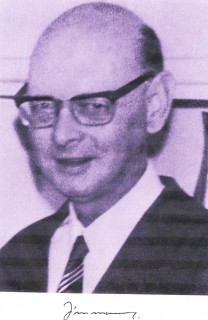Günter Zimmermann was born in Gdansk (Danzig) on Sept 11th, 1914. There he spent his childhood and youth.
After finishing school Zimmermann began to study Modern History in his home town in 1933. During the following years he continued his studies not only in Vienna but also in Berlin, where Anthropology became one of his major subjects. In 1937 Zimmermann began to work on his Ph D thesis.
During World War II Zimmermann had to join the German army. He became a prisoner of war and was disbanded in 1949. He eventually moved to Hamburg and took up his studies again. Franz Termer was among his teachers.
In 1952 Zimmermann completed his Ph D thesis. For the next four years he was fellowship holder of the German Research Foundation (Deutsche Forschungs-gesellschaft, DFG).
Zimmermann took up a position at the State and University Library Hamburg in 1956. There he was responsible for a special section concerning Latin American Cultures (Linga-Library). Moreover, Zimmermann finished his habitation thesis in 1957. He was appointed professor at the university in Hamburg and lectured on Ancient American Languages and Anthropology.
Since 1962 Zimmermann also worked at the german-mexican Puebla-Tlaxcala project. Furthermore, he became head chairman of the newly founded Research Center for Ancient American Languages and Cultures at the Hamburg University in 1967. A year later Zimmermann undertook his first research trip to Mexico, accompanied by his students Berthold Riese and Peter Tschohl.
In 1968/69 Zimmermann contributed to the work of a Collaborative Research Centre (Sonderforschungsbereich Iberoamerikanistik einschl. Altamerikanistik). He also did further field researches in Mexico since 1969.
Günter Zimmermann died in Hamburg on Nov 2nd, 1972.
(Text written by Vincenz Kokot in February 2012, based on BAA Prof. Riese; photo source: http://www.iai.spk-berlin.de/fileadmin/dokumentenbibliothek/Indiana/Indiana_2/IND_02_Zimmermann.pdf)
Short Portrait: Günter Zimmermann

Günter Zimmermann
 further information
further information

